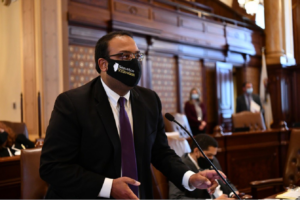Justice Ketanji Brown Jackson is already making a mark on the U.S. Supreme Court. Photo: Kent Nishimura/Los Angeles Times via Getty Images
In her first oral arguments as a justice of the U.S. Supreme Court, Ketanji Brown Jackson offered a history lesson to the solicitor general of Alabama. While presenting arguments in Merrill v. Milligan on Tuesday, Edmund LaCour had the temerity to say that the 14th Amendment’s guarantee of equal protection under the law prohibited his state from considering racial justice when designing congressional districts as required by the Voting Rights Act of 1965. Far from providing for “color blindness” in the operations of government, Jackson countered, the members of Congress who wrote the 14th Amendment were adamant about the need for race-conscious remedies for past discrimination. As Talking Points Memo reported:
“I don’t think we can assume that, just because race is taken into account, that that necessarily creates an equal protection problem,” she said. “Because I understood that we looked at the history and traditions of the Constitution and what the framers and founders thought about, and when I drilled down to that level of analysis, it became clear to me that the framers themselves adopted the equal protection clause, the 14th Amendment, the 15th Amendment in a race-conscious way.”
“I looked at the report that was submitted by the Joint Committee on Reconstruction which drafted the 14th Amendment, and that report says that the entire point of the amendment was to secure rights of the freed former slaves,” she added.
She read out a quote from the legislator who introduced the amendment, and went on to explain that the 14th Amendment was enacted to give a constitutional foundation to the Civil Rights Act of 1866 that was “designed to make people who had less opportunity and less rights equal to white citizens.”
A lot of observers noted that Jackson was cleverly turning around the “originalist” rhetoric of conservatives who so often look to the Founders to for a rationale to support their political preferences. Indeed, Mark Joseph Stern described her as advancing “progressive originalism.”
But she was doing something more fundamental than a sort of tactical jujitsu. She was reminding us all that the “vision of the Founders” so often divinized by small-government conservatives was radically modified by the Civil Rights Amendments enacted during Reconstruction.
There are a lot of problems with the mythology of the all-wise Founders and their eternally valid handiwork. But the most obvious is that the Constitution accommodated the institution of slavery and led to the bloody chaos of the Civil War. When the United States was put together again by righteous violence, three major constitutional amendments were enacted to repair a broken Constitution. The 13th Amendment abolished slavery. The 14th Amendment prohibited states from abridging full citizenship rights or equal protection under the law, particularly for those previously excluded from these privileges. And the 15th Amendment prohibited discrimination in the right to vote on the basis of “race, color, or previous condition of servitude.”
As the great historian of Reconstruction Eric Foner explained, these amendments amounted to a “second founding” of the country and a radical reorientation of the Constitution to focus on ensuring equal rights, especially for former slaves. It was, as Joe Biden might have said, a BFD. It’s because of the 14th Amendment that the Bill of Rights now applies to the states instead of strictly to the federal government. No longer would “states rights” trump civil rights, or so these second founders hoped.
So it is especially perverse to hear the lawyer for a former secessionist, slaveholding state tell the Supreme Court that the 14th Amendment makes it not only acceptable but obligatory to run roughshod over the rights of Black citizens in determining how (and probably whether) they are represented in Congress. And it’s especially appropriate that the first Black woman to serve on the Supreme Court reminded him what “equal protection” actually meant — and means.




